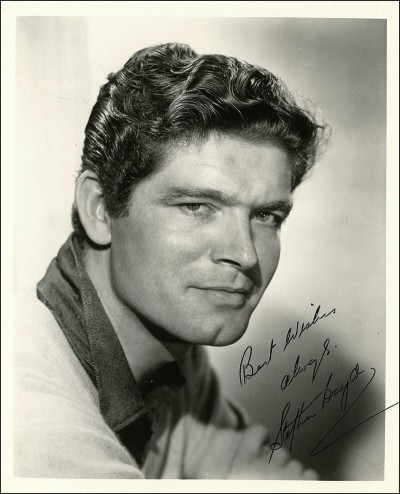Stephen Boyd (William Millar)

Stephen Boyd
Stephen Boyd was born William Millar on July 4, 1931, at Glengormley, Northern Ireland, one of nine children of Martha Boyd and Canadian truck driver James Alexander Millar, who worked for Fleming’s on Tomb Street in Belfast. He attended Glengormley & Ballyrobert primary school and then moved on to Ballyclare High School and studied bookkeeping at Hughes Commercial Academy. In Ireland he worked in an insurance office and travel agency during the day and rehearsed with a semi-professional acting company at night during the week and weekends. He would eventually manage to be on the list for professional acting companies to call him when they had a role. He joined the Ulster Theatre Group and was a leading man with that company for three years, playing all kinds of roles. He did quite a bit of radio work in between as well, but then decided it was distracting him from acting and completely surrendered to his passion. Eventually he went to London as an understudy in an Irish play that was being given there, “The Passing Day”.
In England he became very ill and was in and out of work, supplementing his acting assignments with odd jobs such as waiting in a cafeteria, doorman at the Odeon Theatre and even busking on the streets of London. Even as things turned for the worst, he would always write back to his mother that all was well and things were moving along so as not to alarm her in any way or make her worry. Sir Michael Redgrave discovered him one night at the Odeon Theatre and arranged an introduction to the Windsor Repertory Company. The Arts Council of Great Britain was looking for a leading man and part-time director for the only major repertory company that was left in England, The Arts Council Midland Theatre Company, and he got the job. During his stay in England he went into television with the BBC, and for 18 months he was in every big play on TV. One of the major roles in his early career was the one in the play “Barnett’s Folly”, which he himself ranked as one of his favorites.
In 1956 he signed a seven-year contract with 20th Century-Fox. This led to his first film role, as an IRA member spying for the Nazis in The Man Who Never Was (1956), a job he was offered by legendary producer Alexander Korda. William Wyler was so struck by Boyd’s performance in that film that he asked Fox to loan him Boyd, resulting in his being cast in what is probably his most famous role, that of Messala in the classic Ben-Hur (1959) opposite Charlton Heston. He received a Golden Globe award for his work on that film but was surprisingly bypassed on Oscar night. Still under contract with Fox, Boyd waited around to play the role of Marc Anthony in Cleopatra (1963) opposite Elizabeth Taylor. However, Taylor became so seriously ill that the production was delayed for months, which caused Boyd and other actors to withdraw from the film and move on to other projects.
Boyd made several films under contract before going independent. One of the highlights was Fantastic Voyage (1966), a science-fiction film about a crew of scientists miniaturized and injected into the human body as if in inner space. He also received a nomination for his role of Insp. Jongman in Lisa (1962) (aka “The Inspector”) co-starring with Dolores Hart.
Boyd’s Hollywood career began to fade by the late 1960s as he started to spend more time in Europe, where he seemed to find better roles more suited to his interests. When he went independent it was obvious that he took on roles that spoke to him rather than just taking on assignments for the money, and several of the projects he undertook were, at the time, quite controversial, such as Slaves (1969) and Carter’s Army (1970). Boyd chose his roles based solely on character development and the value of the story that was told to the public, and never based on monetary compensation or peer pressure.
Although at the height of his career he was considered one of Hollywood’s leading men, he never forgot where he came from, and always reminded everyone that he was, first and foremost, an Irishman. When the money started coming in, one of the first things he did was to ensure that his family was taken care of. He was particularly close to his mother Martha and his brother Alex.
Boyd was married twice, the first time in 1958 to Italian-born MCA executive Mariella di Sarzana, but that only lasted (officially) during the filming of “Ben Hur”. His second marriage was to Elizabeth Mills, secretary at the British Arts Council and a friend since 1955. Liz Mills followed Boyd to the US in the late 1950s and was his personal assistant and secretary for years before they married, about ten months before his death on June 2, 1977, in Northridge, California, from a massive heart attack while playing golf – one of his favorite pastimes
30 years after his death, and one has to wonder if he ever realized that perhaps in some way he achieved the goal he set out for himself: to entertain the public and draw attention to the true art of acting while maintaining glamor as he defined it by remaining himself a mystery.
Trivia (10)
Nearly died during the great flu epidemic in London in 1952.
Born
- July, 04, 1931
- Glengormley, Northern Ireland
Died
- June, 02, 1977
- Northridge, Los Angeles
Cause of Death
- Heart attack
Cemetery
- Oakwood Memorial Park Cemetery
- Chatsworth, California



